
Sometimes you remember a book you read by its jacket. Sometimes by the actions of an obscure character. However, there are times when you can’t remember author or title.
I am sure you have racked your brain trying to remember that book you loved reading. Book amnesia has affected us all at some time or another. If you are a book lover of any kind, expect to see (or ask) a question of this type one day:
“Do you remember a mystery book that had something about a puppet master as a murderer?”
Tracking down that long-lost book is like a treasure hunt. In the old days, you could have asked the librarian. Today, search engines like Google have the librarian beat.
Here are some tips to help you find a book without knowing the title or author.
Start Your Book Search With Google
When you can’t (or even if you can) remember the name of a book, author, or the characters in it, Google or any other search engine should be your first port of call. What is true for any generic search is true when trying to find a book without knowing the name and the author too… it’s all about the keywords.
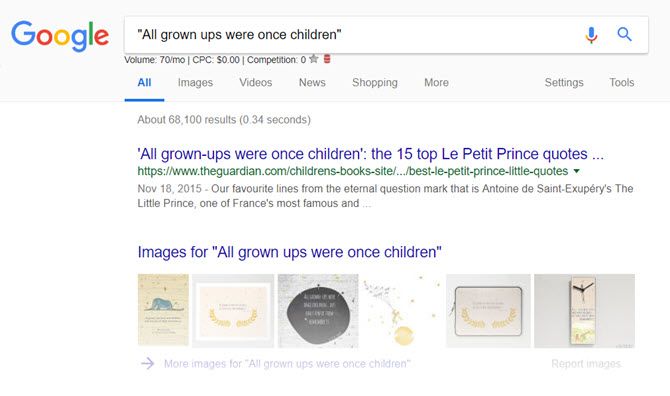
In case of a forgotten title or author, you have to remember anything you can use from the book. It could be the name of a character, a line of dialog, or even basic plot points. The more specific the phrase, the better the result. All rules of a normal search apply (for instance, for exact searches put it in quotes). Google auto-suggestions will also tell you if you are on the right track.
Tip: The search for a long-lost book is a good way to master advanced Google Search skills. For example, you can include or exclude specific keywords, search with an exact phrase, or use the wildcard operator to guess the name of a character.
Now Try Google Books Search
As an avid reader, you should have heard about the massive Google Books Library Project. It is the largest book cataloging project of its kind. Google Books Search works just like Google Search.
The difference is that the reference page displayed for your search result also contains extra information like various covers, tables of content, common terms and phrases, and popular passages from the book. You can view sample pages and check if this is the book you were searching for. Also, you can search within a book.
Use the Advanced Google Search Page with filters like subject, publisher, language, publication date, ISBN and ISSN numbers (you aren’t going to remember these two).
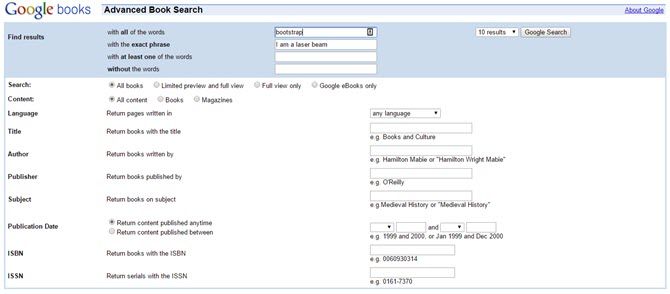
Experiment with keywords and wildcard operators to grab a clue. Even if you do not find the book you’re looking for, you might come across a reference which could then lead you to the answer.
Other Catalogs You Can Use for Your Book Search
There are some search engines which are more specialized for book searches.
BookFinder
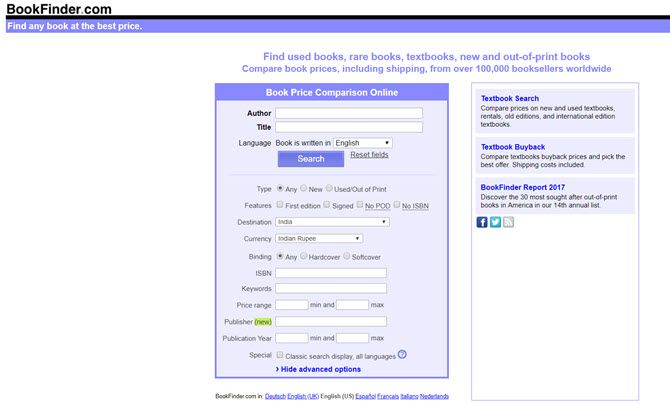
BookFinder is an advanced search engine (Click on Show more options) which taps into the inventories of over 100,000 booksellers worldwide. Try a keyword search or, if you can recall it, restrict your query by the publication year.
WorldCat

WorldCat is the world’s largest network of library content and services. You can search the worldwide database of 72,000 libraries in 170 countries. Search for a book and then locate it at a nearby library. Membership of the library allows you to check out the item online. Try the Advanced Search with unique filters like Audience and Languages.
Peek into WorldCat Genres (or Fictional Finder) which helps you browse through fiction genres for hundreds of titles, authors, subjects, characters, locations, and more, ranked by popularity in the world’s libraries.
The Library of Congress

The Library of Congress (LOC) is the world’s largest library and today it also hosts a huge digital collection. An online book search through its catalog of 167 million items that include books, serials, manuscripts, maps, music, recordings, images, and electronic resources shouldn’t take too long. And to top it all, the LOC has a friendly Ask A Librarian form for queries.
Also, check out the National Library Service for the Blind and Physically Handicapped (NLS) search tool which is another Library of Congress utility.
Tap Into Amazon Search
Amazon started life as an online bookstore. It remains the leading category by sales with millions of titles in stock at any one time. If Amazon doesn’t sell the book you are looking for, then it’s probably no longer available (or just a figment of your imagination). The basic search bar can get you close to the book with a keyword. But the real spadework can be done by Amazon’s Advanced Book Search.
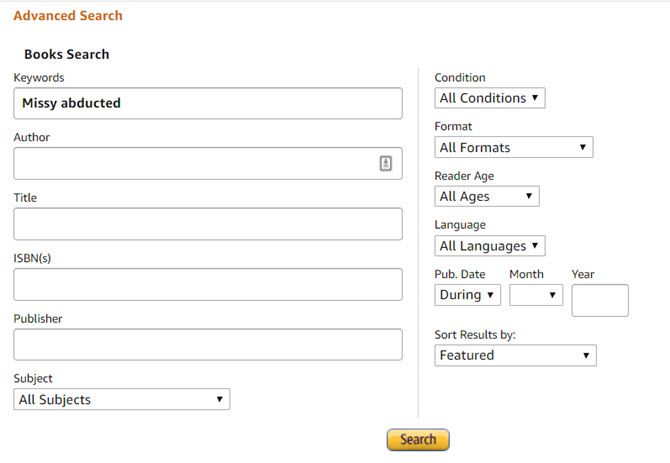
Amazon does not have an official list of advanced search operators. But it does display a few search tips on the above page. The API documentation also lists a few power searches you can try out for your book. Go through the documentation by clicking on “Next”. For instance, experimenting with the [title-begins] keyword could return close hits.
The trick is to cut through the clutter of Amazon search results. Try this neat Amazon advanced search tool called JungleSearch.net to which can help you fetch hidden Amazon search results too.
And if all fails, then do a site search with Google. You might just get lucky. For example:
“Rachel Childs”+journalist site:amazon.com
Search Inside the Book
Amazon not only matches your keywords to titles and authors but also on every word inside a book. You can discover if this is the exact book you are looking for by clicking the Look Inside link and going through the preview pages. Use the Search Inside This Book field to look for sentences, key phrases, and even citations.
Ask for Help From Online Book Communities
Any website which helps you discover your next book will have an online community behind it. Tap into the collective memory of book lovers on these recommended book platforms.
Goodreads
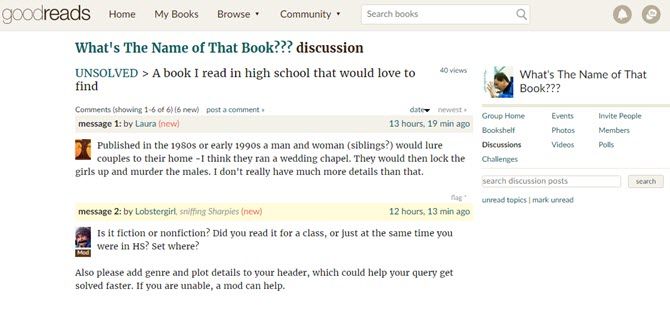
Goodreads is an Amazon subsidiary. As such, you can expect the knowledge base to be just as vast. This social network for book nerds has discussion boards on a variety of topics.
You can go to any genre-specific group and ask for help. But it might be worth trying these two first:
Abe Books: BookSleuth
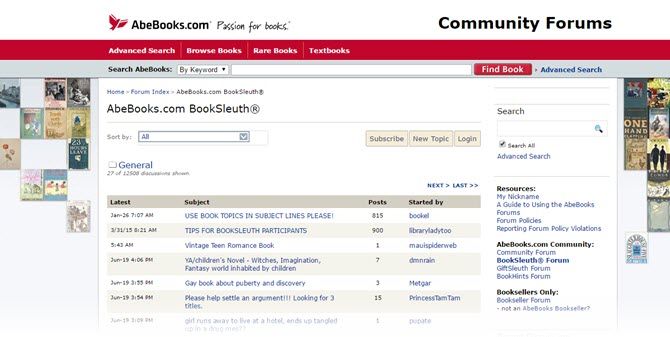
The appropriately named BookSleuth is another good hunting ground for forgotten titles. Use the community forum that is organized by genre, and provide as many details as you can for the members to help you out.
LibraryThing: Name That Book
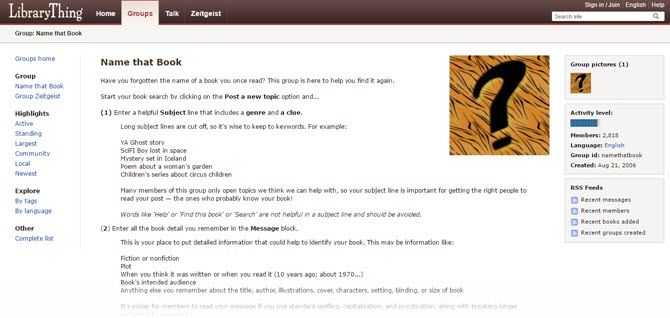
LibraryThing is a less hip, more cerebral alternative to Goodreads. Start a new topic for your specific search in this community group and enter all of the book details you can remember.
Last but Not Least: Social Networks!
By now, you should have got either the book or your memory back. If not, your search has probably reached a frustrating hurdle because the book-loving masses haven’t been able to rescue you yet. It’s time to broaden your scope with an SOS on your social network of choice.
The social network isn’t only for finding long lost friends. You can also call upon the wisdom of the crowd to help you find that elusive book. Your own social circle might be too limited, so broaden your search using book clubs.
Mark Zuckerberg started A Year of Books, and now it has close to 800,000 followers. Even smaller public groups like Books are worth a try. You just have to shout above the noise.
Start with a Twitter search. Hashtags are what makes micro-blogging work, but a generic #books or #bibliophile hashtag might be too broad. Try to plug the specific genre into a hashtag search (e.g. #DarkFantasy or #UrbanFantasy) to narrow your results, and/or when you ask for help.
Quora
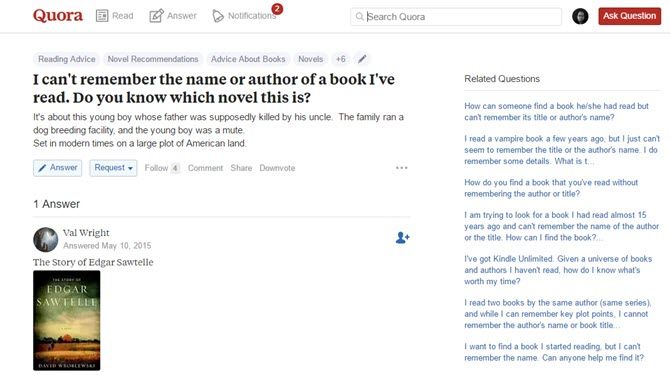
The Q&A site could be the largest gathering of “experts” outside Facebook and Twitter. The best thing about Quora is that you can expect a quality response. Take the answer in the screenshot for example.
Stack Exchange
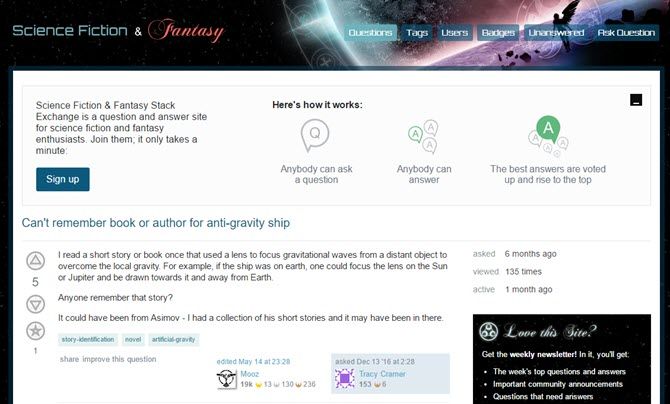
A potpourri of 168 Q&A communities makes up Stack Exchange. Stack Overflow might be the most popular with programmers but there are niche communities for Ebooks and Literature. Then, you can also go into a genre-specific community and drop a question. Sci-Fi and Fantasy is popular.
You couldn’t have thought of a better name for a subreddit on books than Tip of My Tongue. Just scan your eyes down the solved answers with the green tag to understand the power of collective memory. Also, try other subreddits like What’s That Book, Books, and printSF when you can only remember the cover.
Can You Now Find That Lost Book?
The web relies on the kindness of strangers. The good thing is that book lovers are everywhere and the fraternity is amazingly co-operative. We can always find them closeted together in some group or community.
So, the next time you have a memory blackout try to recall any vague detail of the book.
Go back in time to remember any physical feature or illustration. Try to bring up some associated memories—what were you doing when you were reading that book? How old were you? Was it a gift or did you borrow it?
Believe me, every tiny shred of information helps. But the best tip I can offer to every book lover is this—make a reading list and keep it organized!
Read the full article: How to Find a Book Without Knowing the Title or Author
Read Full Article
No comments:
Post a Comment